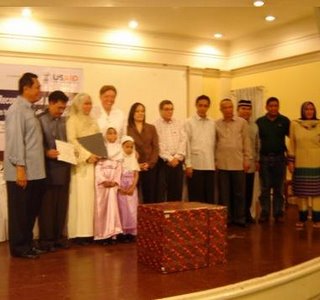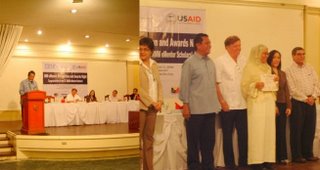 Excellence Awardee Maryam Manalundong with her family strikes a pose with MSU president Ricardo De Leon (left) and USAID representatives during graduation ceremony at Grand Caprice, Cagayan de Oro City.
Excellence Awardee Maryam Manalundong with her family strikes a pose with MSU president Ricardo De Leon (left) and USAID representatives during graduation ceremony at Grand Caprice, Cagayan de Oro City.CAGAYAN DE ORO CITY (Mike Baños / Dec 21) - Teachers in the MSU-System of High Schools and the Autonomous Region in Muslim Mindanao (ARMM) have what EduQuest, Inc. general manager Teresita Medado calls a "happy problem". They don't have enough computers and peripherals to integrate computers and the internet into classroom instruction.
During the Recognition and Awards Night for the IBM eMentor Scholarship program held last week at a local restaurant in Cagayan de Oro, Ms. Maryam Q. Manalundong, who was cited as the "Best Trainer" among the 27 graduates of the program, said they don't have enough computers to enable students to learn "hands-on". They also lacked LCD projectors to make up for the lack of PCs by projecting their lessons to the board for all students to see.
But Ms Medado called this is a "happy problem" because that particular batch of eMentors have "found good use for their PCs" and said she "wanted it recognized." Apparently, EduQuest worked with other schools before which "over-invested" in hardware and software but eventually found little use for it.
Even prior to that, the United States Agency for International Development (USAID) funded Growth in Equity for Mindanao (GEM) program already recognized the need to develop the "humanware" for this project by bringing in the IBM eMentor scholarship program for its Computer Literacy and Internet Connection (CLIC) program.
CLIC aims to promote computer literacy and the use of information and communications technology (ICT) among students and teachers in the ARMM and other conflict-affected areas in Mindanao. It provides internet-linked computers, software, printers, reference materials on computers and the internet, and training on basic troubleshooting and repairs to CLIC-beneficiary schools.
To improve the quality of ICT-facilitated learning in the ARMM, IBM and USAID through GEM launched the IBM eMentor Scholarship Program (also known as the IBM eMentor Teacher Professional Training and Practicum Program) in the ARMM and the MSU System of High Schools.
The IBM eMentor Scholarship Program is implemented and managed by EduQuest, Inc., an affiliate of Asia Pacific College, an institution founded by IBM Philippines and the SM Foundation. As a training provider and consultant on teaching strategies and tools, EduQuest designed the training course and certified the acquisition of competencies gained by teachers through the program. It was also responsible for monitoring the implementing the program by qualified and trained teachers in their own schools.
The program was developed with the rationale that improving the quality of education in the ARMM would help accelerate economic growth in Mindanao, improve the quality of life and bring about a just and lasting peace in the region.

ALUMNI 2006: Views of the video showing featuring the graduates.
In January 2006, 30 teachers were selected from a pool of 85 program applicants using a highly competitive process managed by GEM. Selection criteria included reading diagnosis rating, technology skill level and professional qualifications. As program beneficiaries, each teacher-scholar committed to share the skills they acquired with at least 10 teachers from their schools within 7-10 months after graduating from the program.
From the original pool of 30 qualified applicants, 28 teacher-scholars went through an intensive 8-day training program at the STI computer laboratory in Davao City last January. The training taught them how to maximize ICT applications, tools and resources in the classroom to inspire greater interest and increase the motivation to learn of students, thus increasing the quality of classroom instruction in the region (which has among the lowest literacy rate in the entire country) and also improved their ability to facilitate community participation in the learning process. Outputs and peer feedback were discussed on the last day of training.
Upon returning to their respective schools, the teacher-scholars now turned mentors applied their newly acquired skills and trained at least 10 other teachers, thus increasing the base of trained and qualified teacher-users for CLIC-partner schools.
Through the next 10 months, CLIC and IBM, through EduQuest, monitored and evaluated the implementation of the teacher-mentors' portfolio in their own schools. Twenty seven teacher-mentor scholars completed the requirements of the program and were graduated last December 3, 2006.
The three highest achieving teacher-scholars and who excelled in their specific fields were recognized with awards from IBM and EduQuest. The teacher-mentors were evaluated based on three major criteria: 1) Development and Implementation of Instructional materials using ICT; re-echo training or passing on what they have learned from the IBM eMentor program to their co-teachers, and teacher collaboration through various tools in the internet.
The 27 IBM eMentor Teacher-Scholars are Kusain M. Abas, Leticia S. Adjaril, Ma. Venus P. Aman, Floravel K. Ambas, Saliah Datucali H. Amin, Nor-ain M. Ampang, Aquil S. Andog, Arnold B. Asotigue, Achmad Dimalutang, Camaro T. Edzraphil, Arnel B. Hajan, Renette H. Jecostan, Aidyl Jeffrey A. Jikiri, Florida D. Maddie, Ma. Corazon G. Maguate, Mayleen P. Malagamba, Maryam Q. Manalundong, Caroline T. Marohom, Barbara Ann E. Pangcoga, Ranilo R. Remonde, Jemima O. Ruiz, Rheinjohn A. Sampang, Mariam A. Sunggod, Reynald L. Sykimte, Arlene B. Tawan, Ricardo B. Tarro and Nazer K. Usman.

(Left photo) MSU System President Ric de Leon addresses the graduates. Right photo shows Best Trainer Maryam Manalundong with De Leon and the USAID representatives.
Recognized as the top eMentor Scholars were Ms. Maryam Q. Macalundong, MSU Balindong, Lanao del Sur (1st place), Ms Caroline T. Marohom, Malabang National High School, Lanao del Sur (2nd Place) and Ms Nor-Ain M. Ampang, MSU Balo-i, Lanao del Norte.
Also granted special awards were Marohom (Best in Classroom Demonstrations), Manalundong (Best Teacher's Portfolio, Overall Best Online Discussant, Best Online Discussant/IBM Mentor Place, Best Online Discussant/IBM Yahoo group, Best Trainer), Edzraphil (Simplest Use of Technology to Achieve Maximum Impact) and Mr. Aquil S. Andog (Best Online Discussant/IBM eMentor Blogspot).
Although the program partners committed to continue supporting CLIC through the program, a formidable obstacle over which they basically have no control continues to hound the integration of computers and the internet in the ARMM, especially in Lanao del Sur: inadequate and unstable supply of electricity.
Dr. Ricardo de Leon, MSU- System President, acknowledged this problem but said the National Transmission Corporation (Transco) can hopefully address it in the near future upon the completion of a 69KV transmission line in Lanao del Sur aimed at stabilizing the power supply. Ironically, Lanao del Sur, together with Iligan City, are the hosts communities for the Agus hydro-electric power complex which supplies over half of Mindanao's present power needs.
The CLIC program in the ARMM is managed by Arcille Catherine "Happy" Raagas, herself a former teacher and mentor based in Cagayan de Oro City.
Home


